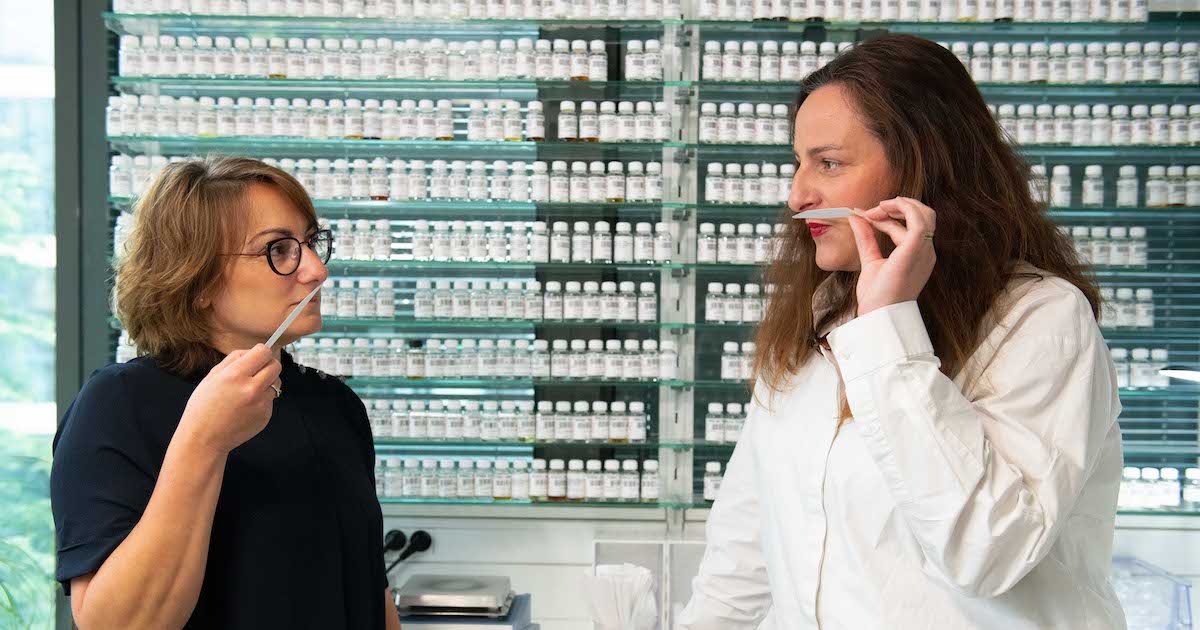Cette publication est également disponible en :
Français
This article was published in partnership with IFF.
Composition house IFF launches its Science of Wellness platform: a tool for understanding the emotions linked to olfactory stimuli based on 40 years of consumer research and development, and designed to boost creativity.
Wellness, long considered an added bonus, is today becoming a must in the use of all categories of scented products, including fine fragrances. A pioneer in research related to this field, IFF is launching its Science of Wellness programme this month, a tool to support creation. To mark the event, Nez interviewed Arnaud Montet, vice-president and director of Human & Consumer Insights at IFF, and his colleague Céline Manetta, doctor in psychology and head of research projects and global innovation in consumer sciences.
Céline Manetta presents the initiative: “The Science of Wellness programme records the effects on the emotions of natural and synthetic ingredients, as well as more complex blends or even fragrances.” The project scope cuts across different categories, as the olfactory stimuli evaluated are separated from product use. This is about smell for smell’s sake. “In this context, we are more likely to talk about ‘humans’ than ‘consumers’,” points out Arnaud Montet. A staggering five billion measurements and pieces of data have been compiled and compared to create a database for consultation. “What is new is that after 40 years of research, we are treating this dimension – emotional well-being – as a grouping of skills and expertise to help perfumers create fragrances,” he continues.
When perfumers receive a perfume or a hygiene product brief – in other words, a creative order, halfway between technical specifications and an ideas booklet – they may well want to endow the formula with emotional and cognitive benefits, either at the request of the commissioning brand or on their own initiative. “This is where we come in, to propose ingredients or combinations of ingredients to guide the benefits towards the chosen emotional territory,” explains Céline Manetta. Compared to traditional research, the field of emotions has a broader range of input, with the introduction of notions such as mindfulness and self-esteem.
Several scientific methods and studies have contributed to the development of this encyclopaedia of smell-emotion. “The explosion of artificial intelligence and data sciences has paved the way over the last five years to detailed analysis of the measurements we have accumulated in more than 40 years of research. We call our AI Scent Intelligence because it combines technological advances and the art of perfumery to give access to measurable and quantifiable emotional and cognitive dimensions,” says Arnaud Montet. For example, the use of neurosciences makes it possible to determine an odour’s emotional imprint without any cultural preconceptions. While the declared benefits of materials were initially reserved for the field of aromatherapy, reinforced by empirical tradition, they are now opening up to other areas. All the more so as we are now seeing the scientific measurement of the result and, especially, the integration of synthetic ingredients, which have rarely been recorded or perceived as beneficial until now.
Perfumes on the market that have already called on the programme in the selection of their ingredients include Irrésistible by Givenchy and CK Eternity Summer. Both contain LMR specialities such as Rose Essential, which contributes to the feeling of happiness. “Generally speaking, consulting the Science of Wellness tool is useful because it allows us to adopt new attitudes to certain materials that challenge our preconceptions. For example, the tests show that natural vanilla, which you might think of as comforting because of its regressive aspect, is actually stimulating,” adds Céline Manetta.
Today, in partnership with LMR Naturals, the branch of IFF dedicated to natural ingredients, the Science of Wellness platform already contains the entire range of natural ingredients and tests their reception under different forms of extraction. We can clearly see that an essence and an absolute will not have the same effects.
In the future, the tool will continue to increase its practical applications. A partnership with the SleepScore application, which measures sleep quality, is underway to diffuse scents at certain phases of the cycle. With Lucas Meyer Cosmetics, an IFF subsidiary specialising in the development of skincare and cosmetics ingredients, new additions to the repertoire are possible while new and more physical types of performance will be studied. “As a rule, since well-being is an all-encompassing concept, we need a holistic approach,” says Arnaud Montet. This is why the tool will increasingly incorporate correspondences between odours and the other senses, such as the identification of intuitive phenomena, which have now been verified.








Comments